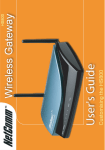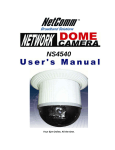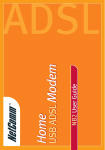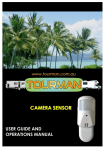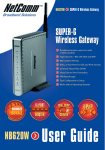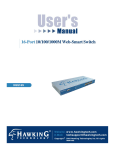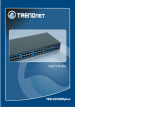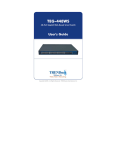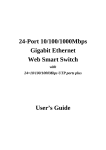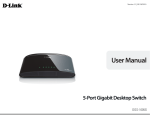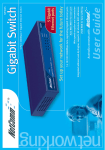Download NetComm NP3024 User's Manual
Transcript
Contents Chapter 1: Introduction ............................................................................................................................................. Gigabit Ethernet Technology ............................................................................................................... Switching Technology ......................................................................................................................... VLAN (Virtual Local Area Network) .................................................................................................. Features .............................................................................................................................................. Package Contents ................................................................................................................................ 4 4 5 6 7 8 Chapter 2: Installation .............................................................................................................................................. 9 Rack Mounting .................................................................................................................................... 9 Connecting Network Cable ............................................................................................................... 10 AC Power ......................................................................................................................................... 10 Chapter 3: Identifying External Components ........................................................................................................... 11 Front Panel ......................................................................................................................................... 11 Rear Panel ......................................................................................................................................... 12 Understanding LED Indicators .......................................................................................................... 13 Power and System LEDs ........................................................................................................... 13 Ports 1~16 or 1~24 Status LEDs ............................................................................................... 13 Chapter 4: Installing the Web Management Utility ................................................................................................. Discovery List .................................................................................................................................. Monitor List ...................................................................................................................................... Device Setting ................................................................................................................................... Toolbar ............................................................................................................................................. File TAB .................................................................................................................................... View TAB .................................................................................................................................. Option TAB ............................................................................................................................... Help TAB .................................................................................................................................. 15 16 17 19 21 21 21 21 21 Chapter 5: Configuring the Switch ......................................................................................................................... Login ................................................................................................................................................. Main Menu ........................................................................................................................................ Setup Menu ................................................................................................................................ Port Settings .......................................................................................................................... VLAN Settings (Virtual Local Area Network) ...................................................................... Trunk Setting ........................................................................................................................ Mirror Setting ....................................................................................................................... Maintenance Menu ..................................................................................................................... Device Status ....................................................................................................................... Statistic ................................................................................................................................. System Setting ...................................................................................................................... Trap Setting .......................................................................................................................... Set Password ........................................................................................................................ Backup Setting ...................................................................................................................... Reset Setting ......................................................................................................................... Logout ........................................................................................................................................ 22 22 24 25 25 26 27 28 28 28 29 30 31 32 33 33 34 NetComm 16 or 24 port Gigabit Switch 2 YML711 Rev1 www.netcomm.com.au Appendix A: Technical Specifications .................................................................................................................. 35 General ............................................................................................................................................. 35 Performance ...................................................................................................................................... 36 Appendix B: Cable Connections ........................................................................................................................... RJ-45 Ethernet Network ports ........................................................................................................... 1000BASE-T straight through cable .......................................................................................... 1000BASE-T crossover cable ................................................................................................... 37 37 38 39 Appendix C: Registering your NetComm Product ................................................................................................ Contact Information .......................................................................................................................... Trade marks and Notices .................................................................................................................. Legal & Regulatory Information Copyright Information .................................................................... Customer Information ................................................................................................................ Warranty .................................................................................................................................... Conditions and exclusions: ........................................................................................................ 40 40 40 41 41 42 43 YML711 Rev1 www.netcomm.com.au NetComm 16 or 24 port Gigabit Switch 3 Chapter 1: Introduction Congratulations on your purchase of the NetComm 10/100/1000Mbps Gigabit Ethernet Web Smart Switch, available in either 16-Port or 24-Port models. This device integrates 1000Mbps Gigabit Ethernet, 100Mbps Fast Ethernet and 10Mbps Ethernet network capabilities in a highly flexible package. In this guide, the term “Switch” (first letter upper case) refers to your 16 or 24 Port 10/100/ 1000Mbps Gigabit Ethernet Web Smart Switch, and “switch” (first letter lower case) refers to other Ethernet switches. This chapter describes the features of your new Switch and some background information about Ethernet/Fast Ethernet/Gigabit Ethernet switching technology. Gigabit Ethernet Technology Gigabit Ethernet is an extension of IEEE 802.3 Ethernet utilizing the same packet structure, format, and support for CSMA/CD protocol, full duplex, flow control, and management objects, but with a tenfold increase in theoretical throughput over 100-Mbps Fast Ethernet and a hundredfold increase over 10-Mbps Ethernet. Since it is compatible with all 10-Mbps and 100-Mbps Ethernet environments, Gigabit Ethernet provides a straightforward upgrade without wasting a company’s existing investment in hardware, software and trained personnel. The increased speed and extra bandwidth offered by Gigabit Ethernet is essential for coping with network bottlenecks that frequently develop as computers and get faster and more applications generate more traffic. Upgrading key components, such as your backbone and servers to Gigabit Ethernet can greatly improve network response times as well as significantly speed up the traffic between your subnets. Gigabit Ethernet enables fast ethernet connections to support video conferencing, complex imaging, and similar data-intensive applications. Likewise, since data transfers occur 10 times faster than Fast Ethernet, servers outfitted with Gigabit Ethernet NIC’s are able to perform 10 times the number of operations in the same amount of time. In addition, the phenomenal bandwidth delivered by Gigabit Ethernet is the most cost-effective method to take advantage of today’s and tomorrow’s rapidly improving switching and routing internetworking technologies. NetComm 16 or 24 port Gigabit Switch 4 YML711 Rev1 www.netcomm.com.au Switching Technology Another approach to pushing beyond the limits of standard Ethernet technology is the development of switching technology. A switch bridges Ethernet packets at the MAC address level of the Ethernet protocol transmitting among connected Ethernet or Fast Ethernet LAN segments. Switching is a cost-effective way of increasing the total network capacity available to users on a local area network. A switch increases capacity and decreases network loading by dividing a local area network into different segments, which don’t compete with each other for network transmission capacity. The switch acts as a high-speed selective bridge between the individual segments. The switch, without interfering with any other segments, automatically forwards traffic that needs to go from one segment to another. By doing this the total network capacity is multiplied, while still maintaining the same network cabling and adapter cards. Switching LAN technology is a marked improvement over the previous generation of network bridges, which were characterized by higher latencies. Routers have also been used to segment local area networks, but the cost of a router, the setup and maintenance required make routers relatively impractical. Today switches are an ideal solution to most kinds of local area network congestion problems. YML711 Rev1 www.netcomm.com.au NetComm 16 or 24 port Gigabit Switch 5 VLAN (Virtual Local Area Network) A VLAN is a group of end-stations that are not constrained by their physical location and can communicate as if a common broadcast domain, a LAN. The primary reason for using a VLAN is to reduce latency and the need for routers. Other VLAN benefits include: Security Security is increased with the reduction of opportunity in eavesdropping on a broadcast network, because data will only be switched to those confidential users within the VLAN. Cost Reduction VLANs can be used to create multiple broadcast domains, thus eliminating the need of expensive routers. Port-based (or port-group) Port-based is the common method of implementing a VLAN, and is the one supplied in the Switch. NetComm 16 or 24 port Gigabit Switch 6 YML711 Rev1 www.netcomm.com.au Features ■ Depending on your model, either 16 or 24×10/100/1000Mbps Auto-negotiation Gigabit Ethernet ports ■ All RJ45 ports support auto MDI/MDIX, so there is no need to use cross-over cables or an uplink port ■ Full/half duplex transfer mode for 10/100Mbps port ■ Full duplex transfer mode for Gigabit port ■ Wire speed reception and transmission ■ Store-and-Forward switching scheme capability to support rate adaptation and ensure data integrity ■ Up to 4K unicast addresses entities per device, self-learning, and table aging ■ 272KBytes packet buffer ■ Supports IEEE 802.3x flow control for full-duplex mode ports ■ Supports port-base VLAN ■ Supports port-base QoS ■ Supports Trunking ■ Supports Port-mirroring ■ Supports Port-setting for Speed/Disable, Flow control ■ Easy configuration via WEB Browser ■ Easy setting via Web Management Utility ■ Standard 19” Rack-mount size YML711 Rev1 www.netcomm.com.au NetComm 16 or 24 port Gigabit Switch 7 Package Contents Open the shipping cartons of the Switch and carefully unpacks its contents. The carton should contain the following items: ■ One 10/100/1000Mbps Gigabit Ethernet Web Smart Switch (available in either 16-Port or 24Port models) ■ One AC power cord ■ Four rubber feet (for desktop usage) ■ Screws and two mounting brackets (for rack mounting usage) ■ CD-Rom with Web Management Utility ■User’s Guide and Package Contents Note If any of the above items are missing or damaged, please contact your local reseller for replacement. NetComm 16 or 24 port Gigabit Switch 8 YML711 Rev1 www.netcomm.com.au Chapter 2: Installation The location where you install the switch stack may greatly affect its performance, therefore we suggest you consider the following before you install your switch: ■ Install the Switch in a fairly cool and dry place. See Technical Specifications for the acceptable temperature and humidity operating ranges. ■ Install the Switch in a site free from strong electromagnetic field generators (such as motors), vibration, dust, and direct exposure to sunlight. ■ Leave at least 10cm of space at the front and rear of the hub for ventilation. ■ Install the Switch on a sturdy, level surface that can support its weight, or in an EIA standard-size equipment rack. For information on rack installation, see the next section, Rack Mounting. ■ When installing the Switch on a level surface, attach the rubber feet to the bottom of each device. The rubber feet cushion the switch and protect the switch case from scratching. Rack Mounting The switch can be mounted in an EIA standard-size, 19-inch rack, which can be placed in a wiring closet with other equipment. Attach the mounting brackets to the switch’s front panel (one on each side), and secure them with the screws provided. Figure 1. Combine the Switch with the provided screws Then, use screws provided with the equipment rack to mount each switch in the rack. YML711 Rev1 www.netcomm.com.au NetComm 16 or 24 port Gigabit Switch 9 Figure 2. Mount the Switch in the rack Connecting Network Cable The Switch supports 1000Mbps Gigabit Ethernet that runs in Auto-negotiation mode, 10Mbps Ethernet or 100Mbps Fast Ethernet that runs both in half and full duplex mode, and 1000Mbps Gigabit Ethernet that runs in full duplex mode using four pair of Category 5 Cable. ☞ Important Note: Some Category 5 cables are only prepared with two pairs (4 wires) of interconnection wires which are not suitable for Gigabit Ethernet over Category 5 cables. In order to use the full performance of this switch in Gigabit mode, please ensure that your cabling uses four pairs (8 wires). The switch’s RJ-45 ports are Auto-MDI and will auto negotiate between 10Mbps, 100Mbps and 1000Mbps depending on the type of cable and connection. The Switch can auto transform to MDI-II or MDI-X, so there is no need to use cross-over cables or an up-link port. AC Power The Switch uses AC power 240V AC, 50 Hz. The power switch is located at the rear of the unit adjacent to the AC power connector and the system fan. The Switch may be turned on without having any or all LAN segment cables connected. NetComm 16 or 24 port Gigabit Switch 10 YML711 Rev1 www.netcomm.com.au Chapter 3: Identifying External Components This chapter describes the front panel, rear panel, and LED indicators of the Switch. Front Panel The figure below shows the front panels of the 16-Port Switch and the 24-Port Switch. Front panel of 16-port Gigabit Ethernet Switch Front panel of 24-port Gigabit Ethernet Switch LED Indicator: Comprehensive LED indicators display the status of the switch and the network (see the following LED Indicators section). Gigabit Ethernet Ports (1~16 or 1~24): Depending on which model you have purchased, the Switch has 16 or 24 Gigabit twisted pair ports, supported auto negotiable 10/100/1000Mbps and auto MDI/MDIX crossover detection function. This supplies true “plug and play” capability. These ports operate in half-duplex mode for 10/100Mbps and full- duplex mode for 10/100/ 1000Mbps. Note: When the port is set to “Forced Mode”, the Auto MDI/MDIX feature will be disabled. YML711 Rev1 www.netcomm.com.au NetComm 16 or 24 port Gigabit Switch 11 Rear Panel Figure 4. Rear panel of the Switch Power Switch: The Power Switch controls the power to the unit and can be turned on after the power cable is connected. AC Power Connector: This is a three-pronged connector that supports the power cord. Plug in the female connector of the provided power cord into this connector, and the male into a power outlet. Supported input voltages range from 240V AC at 50Hz. Reset: The Reset button will restore the unit to its factory defaults. Note: Be sure that you record your Switch’s settings before pressing the Reset button, as any changes to the default will be lost. NetComm 16 or 24 port Gigabit Switch 12 YML711 Rev1 www.netcomm.com.au Understanding LED Indicators The front panel LEDs provides instant status feedback, and assists with monitoring and troubleshooting the Switch when necessary. Figure 5. LED indicators of the Switch Power and System LEDs POWER : Power Indicator On : When the Power LED is on, the Switch is receiving power. Off : When the Power LED is off, the Switch is not receiving power. SYSTEM : Management Indicator Blinking : When the CPU is working, the System LED will blink. On/Off : When the CPU is not working, the System LED will be off. Ports 1~16 or 1~24 Status LEDs Link/ACT : Link/Activity On : When the Link/ACT LED is on, the respective port is successfully connected to an Ethernet network. Blinking : When the Link/ACT LED is blinking, the port is transmitting or receiving data on the Ethernet network. Off : When the Link/ACT LED is off, there is no link. YML711 Rev1 www.netcomm.com.au NetComm 16 or 24 port Gigabit Switch 13 1000Mbps On : When the 1000Mbps LED is on, the respective port is connected to a 1000Mbps Gigabit Ethernet network. Off : When the 1000Mbps LED if off, the respective port is connected to a 10Mbps Ethernet or 100Mbps Fast Ethernet network On : When the 100Mbps LED is on, the respective port is connected to a 100Mbps Fast Ethernet network. Off : When the 100Mbps LED is off, the respective port is connected to a 10Mbps Ethernet or 1000Mbps Gigabit Ethernet network. 100Mbps NetComm 16 or 24 port Gigabit Switch 14 YML711 Rev1 www.netcomm.com.au Chapter 4: Installing the Web Management Utility Refer to the following instructions to install the Web Management Utility and set up your Switch. 1. Insert the provided NetComm CD in the CD-ROM Drive. 2. From the Start menu on the Windows desktop, choose Run. 3. In the Run dialog box, type D:\Web Management Utility\setup.exe (where D:\ is the letter of your CD-ROM drive) and click OK. 4. Follow the on-screen instructions to install the utility. 5. Upon completion, go to Program Files -> web_management_utility and execute the Web Management utility. (Figure 6.) Figure 6. Web Management Utility The Web Management Utility is divided into four areas: Discovery List, Monitor List, Device Setting and Toolbar function. Refer to the following sections for details on each area. YML711 Rev1 www.netcomm.com.au NetComm 16 or 24 port Gigabit Switch 15 Discovery List The Discover List displays the devices available for Web management in the connected network. By pressing the “Discovery” button, you can list all the Web Management devices in the discovery list. Highlight a device and press the “Add to monitor list” button, or double-click on the device listing, to select a device in the Discovery List for monitoring in the Monitor List. The following fields are included in the Discovery List: MAC Address : Shows the device MAC Address. IP Address Shows the current IP address of the device. : Protocol version: Shows the version of the Utility protocol. Product Name : Shows the device product name. System Name : Shows the appointed device system name. Location : Shows where the device is located. Trap IP : Shows the IP where the Trap is to be sent. Subnet Mask : Shows the Subnet Mask set of the device. Gateway : Shows the Gateway set of the device. NetComm 16 or 24 port Gigabit Switch 16 YML711 Rev1 www.netcomm.com.au Monitor List All the Web Smart Device in the Monitor List can be monitored; you can also receive the trap and show the status of the device. The following fields are included in the Monitor List: Symbol : An “S” indicates a system device that is currently being monitored. An “X” indicates a device that is not currently connected. IP Address : Shows the current IP address of the device. MAC Address : Shows the device MAC Address. Protocol version: Shows the version of the Utility protocol. Product Name : Shows the device product name. System Name : Shows the appointed device system name. Location : Shows where the device is located. Trap IP : Shows the IP where the Trap is to be sent. Subnet Mask : Shows the Subnet Mask set of the device. Gateway : Shows the Gateway set of the device. View Trap : The Trap function can receive the events that happen from the Web Management Switch in the Monitor List. There is an indicator icon beside the “View Trap” button. When the indicator icon is green, there is no trap being transmitted. When the indicator icon is red, there is a new trap being transmitted, which can be viewed by clicking on the button. (Figure 7) Figure 7. View trap When the “View Trap” button is clicked, a Trap Information window will be displayed. This window shows the trap information including the Symbol, Time, Device IP and the Event that occured. (Figure 8) YML711 Rev1 www.netcomm.com.au NetComm 16 or 24 port Gigabit Switch 17 The symbol represents a new trap signal record, and will disappear after you review and click on the event record. Figure 8. Trap Information Note: In order to receive Trap information, the Switch has to be configured with Trap IP and Trap Events in the Web browser. Refer to the Trap Setting Menu for more information. Add Item : To add a device to the Monitor List manually, enter the IP Address of the device that you want to monitor. Delete Item : To delete the device in the Monitor List. NetComm 16 or 24 port Gigabit Switch 18 YML711 Rev1 www.netcomm.com.au Device Setting The Device Setting panel allows you to control the configuration of your new Switch. Configuration Setting: The Configuration Setting allows you to set the IP Address, Subnet Mask, Gateway, Set Trap to (Trap IP Address), System name and Location. Select the device in the Discovery list or Monitor List and the click on the Configuration Setting button. The Configuration Setting window will be displayed (refer to Figure 9). After completing the details, type a password and press the “Set” button to apply the changes. Figure 9. Configuration Setting Password Change: The password can be changed by clicking on the “Password Change” button. Enter the original password and the new password and confirm it. Click on the “Set” button to apply the change. Figure 10. Password Change YML711 Rev1 www.netcomm.com.au NetComm 16 or 24 port Gigabit Switch 19 Firmware Upgrade: To upgrade your Switch’s firmware, click on the “Firmware Upgrade” button and enter the firmware path. Do not turn your device off during the firmware upgrade process. Figure 11. Firmware Upgrade Web Access : NetComm 16 or 24 port Gigabit Switch 20 Double click the device in the Monitor List or select a device in the Monitor List and press the “Web Access” button to access the device in your Web browser. YML711 Rev1 www.netcomm.com.au Toolbar The toolbar in the Web Management Utility has four main tabs: File, View, Options and Help. File TAB In the “File TAB”, the following options are provided: Monitor Save : Allows you to save the current setting of the Monitor List as the default. When you open the Web Management Utility, it will automatically load this setting. Monitor Save As: Allows you to record the current setting of the Monitor List in appointed filename and file path. Monitor Load : Allows you to manually load a setting file for the Monitor List. Exit Allows you to exit the Web Management Utility. : View TAB In the “View TAB”, the following options are provided: View Log : Allows you to view the event log of the Web Management Utility and the device. Clear Log : Allows you to clear the log. Option TAB In the “Option TAB”, the Refresh Time function is provided. This function helps you to define the amount of time monitoring the device before a refresh occurs. Select 15 secs, 30 secs, 1 min, 2 min and 5 min for the amount of time that the device will be monitored. Help TAB In the “Help TAB”, the About function indicates the the version of the Web Management Utility that is currently being used. YML711 Rev1 www.netcomm.com.au NetComm 16 or 24 port Gigabit Switch 21 Chapter 5: Configuring the Switch The 10/100/1000Mbps Gigabit Ethernet Web Smart Switch has a Web GUI interface for switch configuration. The Switch can be configured through the Web Browser and a network administrator can manage, control and monitor the switch from the local LAN. This section indicates how to configure the Switch to enable its smart functions including: ■ Port Setting (Speed/Disable, Duplex mode, Flow Control and Port base QoS) ■ Virtual LAN Group setting (VLAN) ■ Trunking ■ Port Mirroring ■ System Setting ■ Device status and Statistic Login Before you configure this device, note that when the Switch is configured through an Ethernet connection, the manager PC must be set on same the IP network. For example, when the default network address of the default IP address of the Switch is 192.168.0.1, then the manager PC should be set at 192.168.0.x (where x is a number between 2 and 254), and the default subnet mask is 255.255.255.0. Open Internet Explorer 5.0 or above Web browser and enter the IP address of your switch. Note: The factory-default IP Address is http://192.168.0.1 Figure 12. Address If you access the device through the Web Management Utility, you do not need to remember the IP Address. Simply select the device shown in the Monitor List of the Web Management Utility to display the device on the Web Browser. When the Login screen appears, enter the default password "admin" and press Login to enter the main configuration window. NetComm 16 or 24 port Gigabit Switch 22 YML711 Rev1 www.netcomm.com.au Figure 13. Login After entering the password, the main page will display the device status. Figure 14. Device Status YML711 Rev1 www.netcomm.com.au NetComm 16 or 24 port Gigabit Switch 23 Main Menu When the main page appears, a menu lists configuration areas on the left side of the screen (Figure 15). Click on the item that you want to configure. There are eleven options: Port Settings, VLAN Settings, Trunk Setting, Mirror Setting, Device Status, Statistic, System Settings, Trap Setting, Password Setting, Backup Setting and Reset Setting, which are divided into the Setup and Maintenance Menus. Figure 15. Main menu NetComm 16 or 24 port Gigabit Switch 24 YML711 Rev1 www.netcomm.com.au Setup Menu The Setup menu includes four items, including Port Settings, VLAN Settings, Trunk Settings and Mirror Settings in Setup menu. Port Settings In Port Settings (Figure 16), each port’s status is displayed. Press the ID parameter to set each port’s Speed, Flow Control, QoS priority and Link Status. When you need to renew the posted information, click on the “Refresh” button. The Link Status on the screen will show the connection speed and duplex mode when connected or will show “Down” to indicated that the port is disconnected. Figure 16. Port Setting To change the port setting, click on the ID parameter of the port. The Port Settings window will be displayed for you to configure the Speed/Disable, Flow control and QoS setting for that Port. Figure 17. Port Setting parameter YML711 Rev1 www.netcomm.com.au NetComm 16 or 24 port Gigabit Switch 25 Speed/Disable: This field has six settings—100M Full, 100M Half, 10M Full, 10M Half, Auto and Disable—to control speed or port disable selections. Flow Control: This setting determines whether or not the Switch will be handling flow control. Set Flow Control to Enable to avoid data transfer overflow. Sets Flow Control to Disable if you do not require flow control or if this is controled by another hardware/software management device. When the port is set to forced mode, then the flow control will automatically set to Disable. QoS: In ports that require a high priority to manage the data transfer, QoS should be set to high. Set the QoS to Normal for ports that do not need to have a high priority for transferring data. VLAN Settings (Virtual Local Area Network) Group individual ports into a small “Virtual” network of their own to be independent of the other ports. To add a VLAN group, press the “Add Group” button. Figure 19. VLAN Group Settings The new VLAN Setting configuration window will be displayed. Select the ports you wish to group together and give them a description name. Once you want to modify the VLAN Group, check on the ID parameter, the ID VLAN configuration window will be displayed. NetComm 16 or 24 port Gigabit Switch 26 YML711 Rev1 www.netcomm.com.au Figure 20. 16 Port VLAN Settings Trunk Setting The Trunk function enables you to cascade two devices with twice the bandwidth (maximum up to 8Gbps in full duplex mode). There are three selections in each group of trunk setting as follow: Group 1: Selection 1(disable), Selection 2(port 1, 2), Selection 3(port 1, 2, 3, 4). Group 2: Selection 1(disable), Selection 2(port5, 6), Selection 3(port 5, 6, 7, 8). Figure 21. Trunk Settings The selected trunk setting port must correspond to the device with the same VLAN group. YML711 Rev1 www.netcomm.com.au NetComm 16 or 24 port Gigabit Switch 27 Mirror Setting Port Mirroring is a method of monitoring network traffic. Port Mirroring forwards a copy of each incoming and/or outgoing packet from one port of a network switch to another port where the packet can be studied. It enables the manager to keep close track of switch performance and alter it if necessary. Configure port mirroring by assigning a source port from which to copy all packets and a sniffer port where those packets will be sent. The selection of the sniffer mode is as follow: RX (receive) mode: this mode will duplicate the data that send to the source and forward to the sniffer port. Figure 22. Mirror Setting Maintenance Menu The Maintenance Menu provides you with the tools you need to ensure that your Network runs smoothly and to control the data traffic. Device Status Click on “Status” to display the device status. The screen will show the System Status, Port Status, VLAN Status, Trunk Status and Mirror Status.. Press “Refresh” when you need to renew the posted information. NetComm 16 or 24 port Gigabit Switch 28 YML711 Rev1 www.netcomm.com.au Statistic The Statistic Menu screen will show the status of each port packet count. Figure 23. Statistic For Detail packet information, click on the ID parameter as Figure 24. Figure 24. YML711 Rev1 www.netcomm.com.au NetComm 16 or 24 port Gigabit Switch 29 System Setting The System Setting includes the System name, Location name, Login Timeout, IP Address, Subnet Mask and Gateway. Through the Web Management Utility, you can easily recognize the device by using the System Name and the Location Name. The Login Timeout sets the idle time-out for the device. If there is no activity in the Web Smart Utility, you must re-login to continue. Insert the IP Address, Subnet Mask and Gateway for the device and click Apply. Figure 25. System Setting NetComm 16 or 24 port Gigabit Switch 30 YML711 Rev1 www.netcomm.com.au Trap Setting The Trap Setting enables the device to monitor events through the Web Management Utility, and to set the Trap IP Address where the trap event information is to be sent. Figure 26. Trap Setting System Events : Monitoring the system’s trap. Device Bootup : A trap is hit when booting up the system. Illegal Login A trap is hit when a user tries to log in using an incorrect password, and it will record the IP address where the incorrect login occured. : Twisted Pair Port Events: Monitoring the copper port status. Abnormal* Receive Error: A trap where there was a receive data error in the copper port. Abnormal* Transmit Error: A trap where there was a transmit data error in the copper port. * Abnormal is a 50 error packet count within 10 seconds. YML711 Rev1 www.netcomm.com.au NetComm 16 or 24 port Gigabit Switch 31 Set Password The Set Password screen allows the network manager to secure the Switch settings. Use this screen to change the password. If you forget the password, you can press the “Reset” button in the rear panel of the Switch to restore the Switch to its factory default settings. Note: All other settings will also be lost, including VLAN, Port Settings, etc. Refer to Backup Setting to back up your settings before restoring the Switch to its factory default. Figure 27. Set Password NetComm 16 or 24 port Gigabit Switch 32 YML711 Rev1 www.netcomm.com.au Backup Setting The backup setting tools help you to backup the current setting of the Switch. Once you need to backup the setting, click on the “Backup” button to save the setting. To restore a previous setting file to the device, identify the backup file and click on the “Restore” button to proceed with restoring the settings of the recorded file. Figure 28. Backup Setting Note: When restoring a recorded file, the current password will not be erased. Reset Setting The Factory Reset button helps you to reset the device back to the default setting from the factory. Be aware that the entire configuration will be reset, the IP address of the device will be set to default setting 192.168.0.1. Figure 29. Reset Setting YML711 Rev1 www.netcomm.com.au NetComm 16 or 24 port Gigabit Switch 33 Logout Select “Logout” to logout of the web configuration pages and return to the Login page. Figure 30. Logout NetComm 16 or 24 port Gigabit Switch 34 YML711 Rev1 www.netcomm.com.au Appendix A: Technical Specifications General Standards IEEE 802.3 10BASE-T Ethernet IEEE 802.3u 100BASE-TX Fast Ethernet IEEE 802.3ab 1000BASE-T Gigabit Ethernet IEEE 802.3x Full Duplex Flow Control Protocol CSMA/CD Data Transfer Rate Ethernet: 10Mbps (half duplex), 20Mbps (full-duplex) Fast Ethernet: 100Mbps (half duplex), 200Mbps (fullduplex) Gigabit Ethernet: 2000Mbps (full-duplex) Topology Star Network Cables 10BASET: 2-pair UTP Cat. 3, 4, 5; up to 100m 100BASE-TX: 2-pair UTP Cat. 5; up to 100m 1000BASE-T: 4-pair UTP Cat. 5; up to 100m Number of Ports 16 × 10/100/1000Mbps Auto-MDIX RJ-45 ports Physical and Environmental AC inputs 240V AC, 50 Hz internal universal power supply Power Consumption 25 Watts (Max) Temperature Operating: 0o ~ 40o C, Storage: -10o ~ 70o C Humidity Operating: 10% ~ 90%, Storage: 5% ~ 90% Dimensions 440 x 210 x 44 mm (W x H x D) EMI: C-Tick - N367 YML711 Rev1 www.netcomm.com.au NetComm 16 or 24 port Gigabit Switch 35 Performance Transmits Method: Store-and-forward Filtering Address Table: 4K entries per device Packet Filtering/Forwarding Rate: 10Mbps Ethernet: 14,880/pps 100Mbps Fast Ethernet: 148,800/pps 1000Mbps Gigabit Ethernet: 1,488,000/pps MAC Address Learning: Automatic update Transmits Method: Store-and-forward RAM Buffer: 272K bytes per device NetComm 16 or 24 port Gigabit Switch 36 YML711 Rev1 www.netcomm.com.au Appendix B: Cable Connections This cable information is provided for your reference only. Please ensure you only connect the appropriate cable into the correct socket on either this product or your computer. If you are unsure about which cable to use or which socket to connect it to, please refer to the hardware installation section in this manual. If you are still not sure about cable connections, please contact a professional computer technician or NetComm for further advice. RJ-45 Ethernet Network ports For 10BASE-T/100BASE-TX/1000BASE-T (10/100/1000BASE) connections, a twisted pair cable with four pairs (8 wires) and RJ-45 connectors must be used. ☞ Caution: Do not plug a phone jack into any RJ-45 port. Doing so could damage the switch. Use only twisted pair cables with RJ-45 connectors. RJ-45 plug attached to cable For twisted pair cables each pair is identified by two different colours. For example, one wire might be red, and the other red with a white stripe. An RJ-45 connector must be fitted to both ends of the cable. Depending on the type of connection, 10Mbps or 100Mbps, use the following Ethernet cable, as prescribed. 10Mbps: Use EIA/TIA-568-100-Category 3, 4 or 5 cable. 100Mbps: Use EIA/TIA-568-100-Category 5 cable. 1000Mbps: Use EIA/TIA-568-100-Category 5e cable. The 1000Base-T Gigabit Ethernet standard uses all four pairs of the Cat 5e cable. Each pair is used to transmit and receive data simultaneously, known as Dual-Duplex transmission. Basically, this is a technique where it is possible to distinguish the direction a signal is travelling. Cat 5e cable is an enhanced version of Cat 5 for use with 1000 Base-T networks, or for long-distance 100 Base-T links (350 m, compared with 100 m for Cat5). It must meet the EIA/TIA 568A-5 specification. Note: To prevent loss of signal, make sure that the length of any twisted-pair connection does not exceed 100 meters. YML711 Rev1 www.netcomm.com.au NetComm 16 or 24 port Gigabit Switch 37 1000BASE-T straight through cable For 1000BASE network connections, all four pairs are used and the cable is wired in a straightthrough configuration. The following table indicates the Pin assignments for a 10/100/1000BASE-T RJ-45 four pair straight-through cable. END 1 END 2 Pin Pair Pin Pair 1 Pair 1+ 1 Pair 1+ 2 Pair 1- 2 Pair 1- 3 Pair 2+ 3 Pair 2+ 6 Pair 2- 6 Pair 2- 4 Pair 3+ 4 Pair 3+ 5 Pair 3- 5 Pair 3- 7 Pair 4+ 7 Pair 4+ 8 Pair 4- 8 Pair 4- NetComm 16 or 24 port Gigabit Switch 38 YML711 Rev1 www.netcomm.com.au 1000BASE-T crossover cable The following table indicates the Pin assignments for a 10/100/1000BASE-T RJ-45 four pair crossover cable. END 1 END 2 Pin Pair Pin Pair 1 Pair 1+ 1 Pair 2+ 2 Pair 1- 2 Pair 2- 3 Pair 2+ 3 Pair 1+ 6 Pair 2- 6 Pair 1- 4 Pair 3+ 4 Pair 4+ 5 Pair 3- 5 Pair 4- 7 Pair 4+ 7 Pair 3+ 8 Pair 4- 8 Pair 3- YML711 Rev1 www.netcomm.com.au NetComm 16 or 24 port Gigabit Switch 39 Appendix C: Registering your NetComm Product All NetComm Limited (“NetComm”) products have a standard 12 month warranty from date of purchase against defects in manufacturing and that the products will operate in accordance with the specifications outlined in the User Guide. However some products have an extended warranty option (please refer to packaging). To be eligible for the extended warranty you must supply the requested warranty information to NetComm within 30 days of the original purchase by registering on-line via the NetComm web site at: www.netcomm.com.au Contact Information If you have any technical difficulties with your product, please do not hesitate to contact NetComm’s Customer Support Department. Email: [email protected] Fax: (+612) 9424-2010 Web: www.netcomm.com.au Trade marks and Notices “NetComm” is a trade mark of NetComm. Windows® is a registered trade mark of Microsoft Corporation. Other brand and product names are trade marks or registered trade marks of their respective holders. Information is subject to change without notice. All rights reserved. Please note that the images used in this document may vary slightly from those of the actual product. Specifications are accurate at the time of the preparation of this document but are subject to change without notice. NetComm 16 or 24 port Gigabit Switch 40 YML711 Rev1 www.netcomm.com.au Legal & Regulatory Information Copyright Information This manual is a copyright protected work. Apart from any fair dealing exceptions for the purposes of private study, research, criticism or review, as permitted under the Australian Copyright Act 1968 (Cth), no part of this manual may be reproduced, stored in a retrieval system or communicated, published, performed or adapted in any form, by any means, be it electronic, mechanical, recording or otherwise, without the prior written permission of NetComm. NetComm accepts no liability or responsibility, for consequences arising from the use of this product or manual. NetComm reserves the right to change the specifications and operating details of this product and manual without notice and does not warrant that any changes to the specifications or operating details of the product will meet the requirements of the customer or will be able to interoperate, remain compatible or coexist with any other hardware or software the customer uses. Registration of warranties, either via the NetComm web site or via post is subject to NetComm’s privacy policy and procedures. Copies of NetComm’s privacy policy and procedures can be obtained from www.netcomm.com.au. Customer Information ACA (Australian Communications Authority) requires you to be aware of the following information and warnings in relation to the purchased product:“ (I) This unit shall be connected to the Telecommunication Network through a line cord which meets the requirements of the ACA TSOOS Standard.“ (2) This equipment has been tested and found to comply with the Standards for C-Tick and or ATick as set by the ACA. These standards are designed to provide reasonable protection against harmful interference in a residential installation. This equipment generates, uses, and can radiate radio noise and, if not installed and used in accordance with the instructions detailed within this manual, may cause interference to radio communications. However, there is no guarantee that interference will not occur with the installation of this product in your home or office. If this equipment does cause some degree of interference to radio or television reception, which can be determined by turning the equipment off and on, we encourage the user to try to correct the interference by one or more of the following measures: • • • • Change the direction or relocate the receiving antenna. Increase the separation between this equipment and the receiver. Connect the equipment to an alternate power outlet on a different power circuit from that to which the receiver/TV is connected. Consult an experienced radio/TV technician for help. (3) The power supply that is provided with this unit is only intended for use with this product. Do not use this power supply with any other product or do not use any other power supply that is not approved for use with this product by NetComm. Failure to do so may cause damage to this product, fire or result in personal injury. YML711 Rev1 www.netcomm.com.au NetComm 16 or 24 port Gigabit Switch 41 Warranty Where the Customer (you) is a consumer as defined by any relevant law such as the Trade Practices Act 1974 (Commonwealth) and similar State laws, certain conditions and warranties (“the consumer warranties”) cannot be excluded, restricted or modified. You then have the benefit of both the consumer warranties and any other warranty that may be provided by the Company or by the manufacturer of the goods. To the extent permitted by Law, all implied warranties and conditions are excluded. All NetComm products have a standard 12 months warranty from date of purchase. However some products have an extended warranty option (refer to packaging). To be eligible for the extended warranty you must supply the requested warranty information to NetComm within 30 days of the original purchase by registering on-line via the NetComm web site at www.netcomm.com.au. To the extent permitted by the consumer warranties, in relation to your product and any other materials provided with the product (“the Goods”) the liability of NetComm under the Relevant Acts is limited at the option of NetComm to: ■ replace the Goods; or ■ repair of the Goods; or ■ pay for the cost to replace the Goods; or ■ pay for the cost to repair the Goods. NetComm 16 or 24 port Gigabit Switch 42 YML711 Rev1 www.netcomm.com.au Conditions and exclusions: The warranty is granted on the following conditions: 1. This warranty extends to the original retail Customer (you) and is not transferable; 2. This warranty does not apply to software programs, batteries, power supplies, cables or other accessories supplied in or with the product; 3. You must comply with all of the terms of any relevant agreement with NetComm and any other reasonable requirements of NetComm including producing such evidence of purchase as NetComm may require; 4. The cost of transporting the product under a claim based on this warranty to and from NetComm’s nominated premises is your responsibility; and 5. NetComm does not have any liability or responsibility under this warranty where any cost, loss, injury or damage of any kind, whether direct, indirect, consequential, incidental or otherwise arises out of events beyond NetComm’s reasonable control. This includes but is not limited to: acts of God, war, riot, embargoes, acts of civil or military authorities, fire, floods, electricity outages, lightning, power surges, or shortages of materials or labour. 6. You are responsible for the security of your computer and network at all times. Security features may be disabled within the factory default settings. NetComm recommends that you enable these features to enhance your security. YML711 Rev1 www.netcomm.com.au NetComm 16 or 24 port Gigabit Switch 43













































